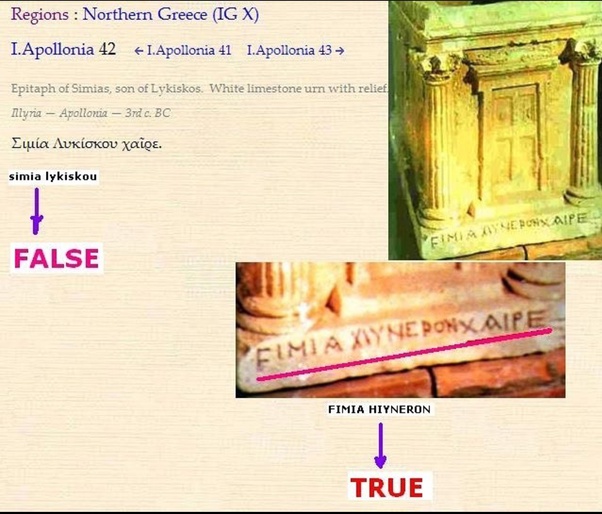Ancient Macedonia, was not a country which would look like a modern state, with an unified language and culture. Most of the ancient state entities were run by powerful theocrats who usually didn't speak the same language/s as the regular people.
The Macedonian rulers and theocrats, most likely have used a Greek dialect, for their religious activity, but the regular people must have used one or more different spoken languages. We simply don’t know. We don’t even know if the Greek spoken by the elite, for their liturgy, is the Greek we know, because although many believe Greek was the vernacular language of a distinct nation, in fact it wasn’t. But that’s another issue, which leads to a long discussion, because people use the modern standards, to judge about the ethnicity and nationality of the past.
So for now lets leave the ancients, and lets go to the Middle ages.
In 1685 Petro Bogdano the archbishop of Scopie and Kingdom of Serbia, published in Italy his bilingual Gospel called “Cyneus Prophetarum” in Italian and Epirotic
What language is the Epirotic? It is certainly Albanian and there is no discussion about that:
but Bogdano calls himself a Macedon, which apparently is another identity. Not for Bogdano thou, he calls himself: born a Macedonian who master only Albanian, his native language well, out of the two languages Italian and Epirotic(Albanian) that he wrote the book.
So Macedonian is the Epirotic language, Albanian language.
Now someone would assume that because of the “bad habit” of the Middle Ages authors to call the new nations by their ancient names, will justify the fact that Macedonian and Epirotic are called Albanian . Fair enough, but then what happened to the Greek if the language of Macedonians and Epirots were to be originally Greek?
At this point someone will assume… I don’t know what.
The truth is that we don’t know what face the Greek language, have had in the past, but during Middle ages, the language scholars called it DEAD LANGUAGE, SCHOLASTIC a language USED ONLY BY THE LEARNED, NOT A NATIONAL LANGUAGE.
And by that we already know that the Greek, has been in the first place A SACRED LANGUAGE, not used by regular people.
The same authors(Johannes Amos Comenius 1592-1670), of the Great Didactic (Didactica Magna) keep calling Epirotic as Albanian, used in Epirus and Macedonia, and not strangely enough Serbian a dialect of the Bulgarian, and by Bulgarian they mean Old Church Slavonic, another sacred language, created almost 1000 years after, ancient Macedonia.
Now, the same Petro Bogdano, gives a time and a place about Alexander the Great Monarchy:
At this point, the time is not important but the place is, according to Bogdano, is Petrela Albania, which in Italian version is Pella. Strangely enough the name Macedonia(in Italian version) is called Matti in Albanian version, which reminds us the old name of it Emathia, a significant meaning in Albanian language: e mathia= the big one. As if this was not enough, he calls Alexander the Great: LEKA I MATH, which means the same thing: Alexander the Great, with a meaningful difference, that calling him like this, means he was son of that land, Albanian land. It’s clear that Bogdano, didn’t just create a spoiled name for Alexander, but he calls him by the name his own people call their son LEKA, and the name that 400 years after, Albanian nation would name their currency LEK
The same LEKA, was not an unclaimed Albanian figure, Scanderbeg himself, claimed him, his followers and Epirots who successfully fought against Rome, as Albanians:
But Scanderbeg had no idea that a time would come that a new nation created only in the 19th century will manage to convince the entire world, that Macedonians were Greeks, a thesis they will have hard time to prove, because the intellectuals long before them, in their own language, have permanently established what nation the Macedonians belong:
The Albanians more than any other nation on the face of Earth deserve to be called Macedonians.




